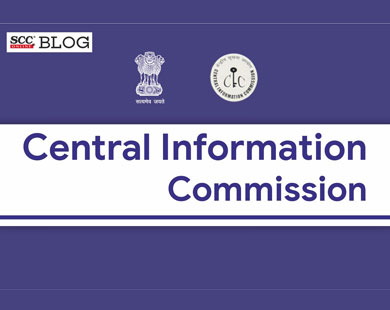Central Information Commission: The complainant being dissatisfied with the information being provided by the First Appellate Authority, on the ground of non-receipt of complete and correct information regarding the reimbursement of pending medical bills of the Damodar Valley Corporation, Kolkata (‘DVC’) pensioners since long, filed a complaint before the Central Information Commission (‘The Commission’) wherein the Information Commissioner, Saroj Punhani stated that
“The issue raised by the Complainant during hearing in the instant matter is not as much as about seeking access to information per se and in fact, it is about the Complainant’s resolve of bringing to fore his grievance pertaining to alleged delay caused by DVC in reimbursement of medical expenditure/ bills of pensioners and further seeking clarifications from the CPIO in this regard.”
Facts
Medical bills for reimbursement of several pensioners of DVC were pending since long due to inordinate delay in passing of the bills, causing great hardship to the ailing pensioners, some of whom needed immediate reimbursement and some of whom were in super senior-citizen category. Moreover, a hefty amount was being deducted from their genuine medical bills due to which the pensioners were further put to grave financial crisis at their old age.
In the case, the complaint had sought the following information:
-
Number of medical bills of Pensioners pending for reimbursement as on date.
-
Date from which the medical bills of Pensioners were pending for reimbursement.
-
Copy of the docket of medical bills of Pensioners registered with the Medical Department with the amount of each pending bill.
-
Daily progress report of processing for payment of the medical bills of Pensioners for reimbursement.
-
Total amount deducted from the Pensioners for the Financial Year 2020- 2021.
-
Total amount reimbursed to the Pensioners in the Financial Year 2020- 2021 till date.
-
Year-wise amount deducted from the Pensioners for the Financial Year 2018-2019 & 2019-2020.
-
Year-wise amount reimbursed to the Pensioners in the Financial Year 2018-2019 & 2019-2020.
-
Year-wise amount contributed from DVC for reimbursement of medical expenditure to Pensioners for the Financial Year 2018-2019, 2019-2020. 2020-2021.
The Chief Public Information Officer (‘CPIO’) in her written submission had stated that a statement of account for reimbursement of medical expenditures of pensioners for the financial years 2018-19, 2019-20 and 2020-21 was provided to the complainant.
The Commission’s Decision
The Commission stated that the crux of the issue was not about seeking access to the information per se but to resolve the problem pertaining to the alleged undue delay in providing reimbursement of medical bills of the DVC’s pensioners and further seeking clarification from CPIO in this regard.
The Commission held that from the point of view of the Right to Information Act, 2005 (‘RTI Act’), the reply furnished by CPIO was adequate to provide for clarifications for questions raised in the RTI application.
The Commission drew the attention of the complaint towards the judgment of the Supreme Court in CBSE v. Aditya Bandopadhyay, (2011) 8 SCC 497 which interpreted the scope and ambit of S. 2(f) of the RTI Act and held that “A public authority is also not required to furnish information which require drawing of inferences and/or making of assumptions. It is also not required to provide `advice’ or `opinion’ to an applicant, nor required to obtain and furnish any ‘opinion’ or ‘advice’ to an applicant. The reference to ‘opinion’ or ‘advice’ in the definition of ‘information’ in section 2(f) of the Act, only refers to such material available in the records of the public authority.”
Accordingly, the Commission held that trying to outstretch the interpretation of S. 2(f) of the RTI Act by including deductions and inferences to be drawn by the CPIO was unwarranted as it casts immense pressure on the CPIO to ensure that they provide the correct inference to avoid being subject to the penal provisions under the RTI Act.
Similarly, with respect to the jurisdiction of the Commission under the RTI Act, the Commission relied upon the Delhi High Court judgement in Govt. of NCT of Delhi v. Rajender Prasad WP(C.) 10676 of 2016 which held that
“6. The CIC has been constituted under Section 12 of the Act and the powers of CIC are delineated under the Act. The CIC being a statutory body has to act strictly within the confines of the Act and is neither required to nor has the jurisdiction to examine any other controversy or disputes.”
Thus, the Commission held that no further action was warranted in this regard, however, by taking an empathetic view in the matter, copy of the order was sent to the Chairman of DVC to take note of the serious concern raised by the complainant alleging near absence of any protocol that prescribes action to be taken in the instance where delay to that extent has been caused by the respondent organisation in reimbursement of medical expenditure of pensioners within a reasonable time period.
The Commission observed that “the said concern glaringly reflects on the plight of the pensioners who are rendered at the receiving end of such mishaps causing them mental agony while also wasting their living years.”
The Commission suggested the DVC to explore the viability of instituting a Standard Operation Procedure to be followed in case of such eventualities to ensure time bound redressal/relief to the affected people.
[Ashok Kumar Jain v. CPIO, 2022 SCC OnLine CIC 578, decided on 19-12-2022]







